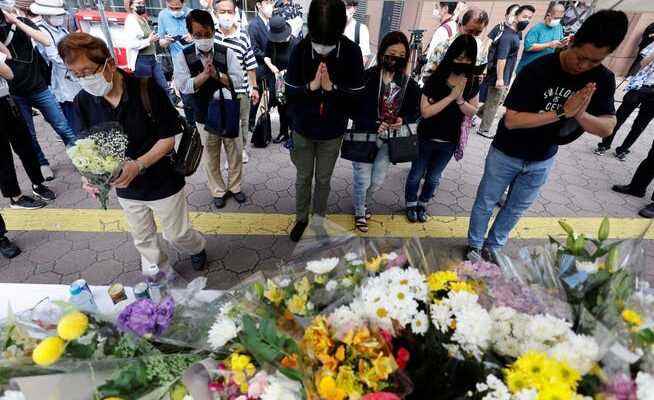The day after the assassination that shocked Japan and the world, doubts are being raised about local security measures. The perpetrator has also admitted to having made preparations since the spring.
People lay flowers and say prayers for assassinated former Japanese Prime Minister Shinzo Abe.
so. / (dpa/Reuters)
The day after the assassination of Japan’s former Prime Minister Shinzo Abe, many people visit the site where the attack happened to lay flowers and say prayers. Long queues formed outside a tent sheltered from the summer heat near Yamato-Saidaiji Station in Nara.
According to Japanese media reports, a motorcade left the hospital in Nara where Abe had been admitted early on Saturday morning in the direction of Tokyo in order to transfer the body there as soon as possible, at the request of Abe’s wife Akie. A wake is planned for Monday night, and the funeral is to take place in Tokyo on Tuesday.
The police of the country is now faced with many questions. Among other things, experts on Saturday dealt with why the security personnel on site could not prevent the attack with a self-made firearm. “I don’t think there are enough precautions for firearms in Japan, with its strict gun laws,” an expert on personal protection was quoted as saying by the newspaper “Nikkei”. Another security expert told Japanese television the evening after the assassination that in his view, for example, there had been a failure to block traffic near the venue.
It is typical for Japanese politicians to position themselves in key locations during an election campaign, shaking hands with passers-by and delivering speeches. On one such occasion, the day before, the perpetrator had approached Abe in the city of Nara on the open road from behind and shot the politician twice from a few meters away. He had used what he said was a self-made weapon.
More details about his motive are now known. The perpetrator told police that he harbored a grudge against a religious organization and believed Abe was affiliated with that group. There are reports that the perpetrator may not have chosen Abe as his primary target, but instead wanted to harm the organization or senior officials. According to his own statements, the 41-year-old man started making the weapons in the spring.
According to media reports, the National Police Authority now wants to check its security protocol for prominent personalities for deficiencies. The police searched the perpetrator’s home on the day of the attack. Several self-made firearms and explosive substances were seized. She also searched his parents’ house.
The 41-year-old unemployed man, who served in the Navy for three years until 2005 and is said to have been trained there in handguns and regularly took part in shooting training, was arrested immediately after the attack. Japan is considered one of the safest countries in the world and has extremely strict gun laws.
